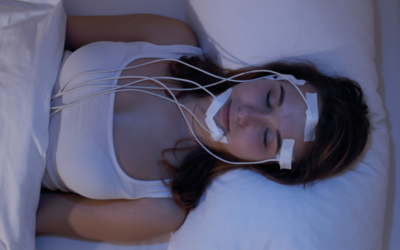Good quality sleep can dramatically improve neurologic rehabilitation outcomes. Getting adequate sleep might also decrease the rate of disease progression in some neurodegenerative diseases (multiple sclerosis, Parkinson’s disease, or ALS). Beyond that, Sleep has been linked to improved memory, mood and cognition. With that said, today we are going to do a deep dive on the stages of sleep, the health benefits of sleep and how to improve overall sleep quality.
What is sleep?
Sleep is the naturally, easily reversible periodic state marked by the absence of wakefulness and by the loss of consciousness of one’s surroundings.
What are the stages of sleep?
Sleep is broken up into stages, NREM (non rapid eye movement) and REM (rapid eye movement). NREM is further divided into 3 stages (N1-N3). Each cycle of stages lasts 90-120 min and humans cycle through these stages 4-5 times per night.
NREM
Stage 1-2
- The body progresses from a state of wakefulness to sleep
Stage 3
N3 is the deepest stage in sleep in the sleep cycle. It is often referred to as slow wave sleep.
Characteristics of this stage of sleep include:
- Decrease in muscle tone, pulse rate, and breathing rate
- 90% of growth hormone is released (critical hormone for growth and development of most body systems).
REM
As we transition into REM sleep the body becomes more alert similar to wakefulness. REM sleep accounts for 18-25% of the sleep cycle. Other characteristics of this stage of sleep include:
- The body is easily arousable
- Muscles become paralyzed with the exception of eye muscles and breathing muscles
- Heart rate and breathing rate increase
- Amygdala is more “active” (possibly important for processing emotions)
- involved in memory consolidation
How might sleep benefit neurologic rehabilitation?
Improve mood
Adequate sleep allows the body to rest and allows us to wake up feeling refreshed and energized. This has a positive impact on our overall mood and participation in rehabilitation activities.
Heart health
As mentioned earlier, during slow wave sleep the heart rate and blood pressure decrease. If the body missed out on this critical stage of sleep this might weaken the heart muscle (think about a car engine that is running all the time). This weakening of the heart muscles can lead to heart disease, heart attack, and heart failure. In fact, some literature suggests that individuals who have poor sleep quality are 63% more likely to develop cardiovascular disease.
Regulated blood sugar
Sleep increases insulin release. Insulin promotes the absorption of glucose into the cells of the body. On the other hand, decreased insulin causes glucose to build up in the blood. Excess glucose in the blood (this is where the glucose must stay if it doesn’t enter the cells) for prolonged periods of time leads to insulin resistance. Not getting enough sleep ultimately leads to insulin resistance which might cause unnecessary degradation to intact neurons (nerve cells) in the brain.
Brain plasticity
Many studies have shown that memory consolidation (and learning) occurs during sleep. In particular, this has been studied with people who have had a stroke.
Immune function
The body increases the production of immune cells at night. This is important for fighting infection but also to strengthen adaptive immunity (the memory component of the immune system). The immune system might also play a role in decreasing the downstream damage that occurs in the brain resulting from a stroke or brain injury.
Maintaining healthy weight
Good sleep quality promotes healthy body weight. This has to do with two hormones involved in hunger and satiety, leptin and ghrelin. Leptin is produced by adipose cells and promotes satiety (feeling full). Ghrelin is secreted from the stomach and intestine and sends a signal to the brain telling the brain you are hungry. Acute sleep deprivation has been shown to cause ghrelin levels to rise. Futhermore, chronic sleep deprivation has been shown to cause leptic levels to fall. In addition to this change in our hunger and full signals, being awake longer means more opportunity to eat resulting in more calorie consumption. That is surely a double whammy when it comes to maintaining a healthy weight.
How is sleep regulated?
There are two internal body clocks that work together to promote sleep at night and wakefulness during the day.
Sleep Homeostasis
Sleep-wake homeostasis is one of the two body clocks that is regulated by the number of hours that we are awake. The longer a human stays awake, the greater the drive will be to go to sleep
Circadian Rhythm
The second internal body clock is called the circadian rhythm. This is influenced by the sun and a 24 hour period.
What are the cues that influence the internal body clocks?
Light Exposure
Light exposure early in the morning promotes wakefulness. Additionally, darkness in the evening will prompt our brain to release melatonin (a hormone that promotes sleep).
Social Interactions
Believe it or not, our social circle can impact our health. Moral of the story? Make friends that go to sleep at a reasonable hour.
Meal Schedule
Eating late at night might promote wakefulness.
Work Schedule
How much sleep is required to improve neurologic rehabilitation outcomes?
7-9 hours per night.
How do you improve sleep quality?
Sleep hygiene (good sleep habits) are one way to help improve sleep quality in individuals who experience mild to moderate insomnia. If you are someone who has difficulty staying asleep or falling asleep, here are some things you might try:
- Remove electronic devices, such as TVs, computers, and smart phones, from the bedroom
- Triggers the arousal system
- Avoid
- large meals – tricks the mind into arousal state
- Caffeine – Caffeine blocks adenosine (sleep promoting neuromodulator)
- Alcohol – Alcohol is known to inhibit REM sleep
- Get some exercise
- Being physically active during the day can help you fall asleep more easily at night.
- Make sure your bedroom is quiet, dark, relaxing, and at a comfortable temperature
- Be consistent and try and go to bed at the same time every night (including weekends)
Other articles you might be interested in:
Health Benefits of Broccoli Sprouts
Broccoli Sprouts Broccoli sprouts may be small in size, but they pack a powerful punch when it comes to health benefits. These tiny sprouts are loaded with nutrients and antioxidants that can help protect against a range of health issues, from cancer to heart disease....
Review of Trekking Poles
Best Trekking Poles for Fitness Walking Trekking poles are an excellent way to take your leisure walk into a fitness walk. More than that, walking poles can give more stability on uneven terrain, add an arm workout, and enable some to walk at a faster pace. But not...
Is Reverse Osmosis Water Filtration Better For You?
Water is essential for life, but not all water is created equal. Tap water can contain harmful contaminants and chemicals that can have adverse effects on our health. This is where reverse osmosis water purification comes in. Reverse osmosis (RO) is a highly effective...
Turn your daily walk into a fitness walk
Ways to get a workout out of your daily walk Daily walks have grown in popularity over the last few years. And for good reason. They are a great way to get sunlight, clear your mind, and breathe in some fresh air. Incorporating walks into your day is also a great way...
Health Benefits of Omega 3 Fatty Acids
Health Benefits of Omega-3 Fatty Acids and Recommended Foods Omega-3 fatty acids are an integral part of cell membrane phospholipids. They provide structure, act as a barrier to protect cells from environmental aggression, and influence various bodily functions to...
Health Benefits of Daily Sunlight
Health Benefits of Daily Sunlight There are two sides to every coin—and two stories to tell about sunlight. Skincare enthusiasts and specialists, it seems, have taken a definitive stand against the sun, branding it as a villain that causes premature aging and leads to...
Can a sleep study improve health?
Sleep is an essential part of our daily routine. Quality sleep might also be a critical factor in maintaining good health. However, many people suffer from sleep disorders that can lead to serious health problems. A sleep study is a diagnostic test that can help...
Increase Physical Activity with Exercise Snack
Physical activity could be the single most important lifestyle habit. In fact, it may help cope with the symptoms of a chronic condition and improve overall health. The CDC recommends 150-300 min of moderate-intensity activity per week. But fitting exercise into a...
Benefits and Harms of Dietary Fat
Fat is one of three macronutrients found in food that is essential for cell survival in humans. However, it is often demonized as being “unhealthy”. But that couldn’t be further from the truth. Some fats have been linked to improved cognition and decreasing the risk...
Protein Improves Brain Health
Studies have shown that diets high in animal protein may help to prevent neurological conditions such as Alzheimer's disease and Parkinson's disease. Furthermore, there is a growing body of evidence that animal protein might be the key that unlocks the door to health...











